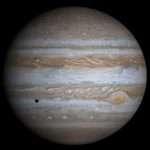Going back for a pint of milk
‘Blast’.
There was no milk in the fridge.
There had been a filling station next door, where convenience compensated for cost, and where he would have bought milk and, inevitably, chocolate; but it had closed upon the opening of the motorway. With the exception of the odd heavy goods vehicle whose driver was intent upon avoiding paying tolls, only local traffic passed through the town and anyone local knew that the garage next door was the most expensive of the three in the town. The other two maintained a 24 hour vigil, though business in the small hours must be lean enough.
He put on a coat and wrapped a scarf around his neck and stepped out into the chill air of the February night. Jupiter shone brilliantly in the evening sky; it would not have been hard to see how the ancients might have attributed extraordinary powers to the planets.
It was not yet seven, time enough to walk to the small supermarket in the main street. Each time he walked through the town, he would try to imagine what it might have been like in former times. What was it like when the market house still stood in the square? What was it like on fair days, when crowds gathered from miles around and when cattle were herded through the streets?
It had never been at the hub of things. Even the railway station, long since closed, stood three miles south of the town; its fine grey stone Victorian buildings and black slate roof falling into gradual dereliction. The prosperity of the boom years had hardly affected the town; a couple of housing estates had appeared on the edges, but there was little sign of the changes seen in towns closer to the capital.
Between his house and the supermarket there were twelve closed businesses; some had ceased trading years, perhaps decades ago, lettering above curtained windows being the only sign that the premises had once been a place of employment, a place that had contributed to the well-being of the local economy.
A solitary youth stood staring from within the fish and chip shop. The light within and the darkness outside meant he would have seen little more than his own reflection. The youth’s face was impassive; the expression vacant and remote.
A gust of wind prompted an adjustment of the scarf. Perhaps if the wind blew, there would be no frost later. Most of the town’s remaining businesses were now closed. Passing a pub door, there was the sound of voices. Once Saturday evening would have filled the eighteen pubs that traded in the town, now only half a dozen of those remained and the vigorously enforced drink-driving laws ensured custom was thin.
A predecessor had spent more than thirty years here, perhaps he had not thought it long. What had it been like, though, to be so long in the one place? What had there been by way of entertainment when Radio Eireann had been the entirety of Irish broadcasting and when trips to Dublin had been rare occurrences?
He screwed up his eyes and stared down the street. Maybe it was not so hard to imagine a Ferguson tractor and a Morris Minor parked at the kerb; maybe the sound of an Austin A35 van was carried on chill breeze.
The young woman in the supermarket bade him ‘good evening’ and he walked briskly back to the warmth of his house.
Plugging in the mobile broadband, he switched on his laptop and checked the French rugby scores. The past was another country and he had no wish to spend long on it shores.



That reminds me of driving through dark seemingly empty small towns, with the only illumination the flickering purple neon of the fly killer inside the closed for the night Chinese chipper.
William Trevor beautifully captures a sense of that small town Ireland in some of his writing.
Your writing is very evocative Ian.